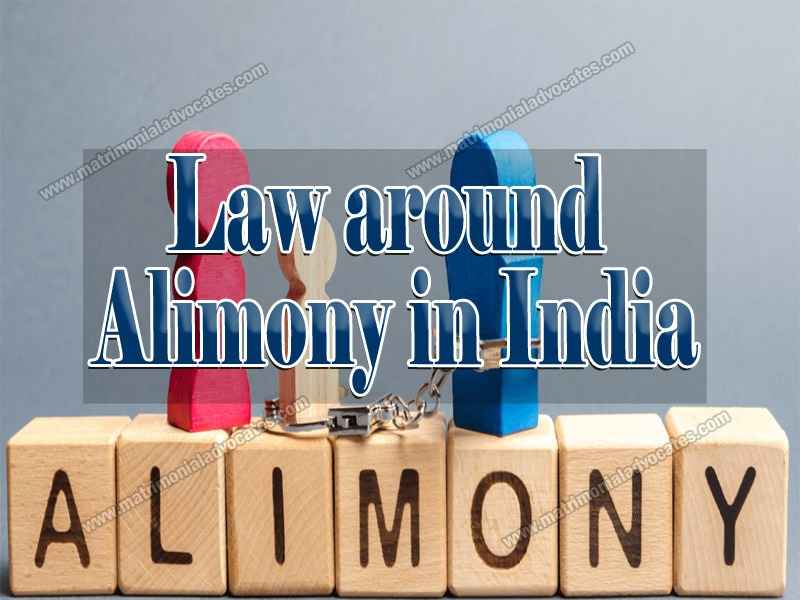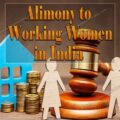
Alimony connotes a duty on the part of the spouse to maintain the other spouse who is dependent on them. Alimony and maintenance have the same meanings but they are often used interchangeably in different places. In India alimony is generally used after divorce whereas maintenance is used for both before and after divorce.
Provisions for alimony under various laws:
Under Hindu Law – Section 25 of Hindu Marriage Act
Section 25 of the Hindu Marriage Act talks about alimony:-
Permanent alimony and maintenance .
(1) Any court exercising jurisdiction under this Act may, at the time of passing any decree or at any time subsequent thereto, on application made to it for the purpose by either the wife or the husband, as the case may be, order that the respondent shall 55 [***] pay to the applicant for her or his maintenance and support such gross sum or such monthly or periodical sum for a term not exceeding the life of the applicant as, having regard to the respondent’s own income and other property, if any, the income and other property of the applicant 56 [, the conduct of the parties and other circumstances of the case], it may seem to the court to be just, and any such payment may be secured, if necessary, by a charge on immovable property of the respondent.
(2) If the court is satisfied that there is a change in the circumstances of either party at any time after it has made an order under sub-section (1), it may at the instance of either party, vary, modify or rescind any such order in such manner as the court may deem just.
(3) If the court is satisfied that the party in whose favour an order has been made under this section has re-married or, if such party is the wife, that she has not remained chaste, or, if such party is the husband, that he has had sexual intercourse with any woman outside wedlock, 57 [it may at the instance of the other party vary, modify or rescind any such order in such manner as the court may deem just].
Under Christian law – Section 38 of the Indian Divorce Act, 1869, deals with the rules regarding payment of alimony. It may be given to the wife herself or to any trustee on her behalf. The objective is to ensure the wife is given alimony
Under Parsi Law – Section 40 of the Parsi Marriage and Divorce Laws, 1988, which talks about permanent maintenance and alimony.
The purpose of alimony
The purpose behind providing alimony to wife has been provided by the Rajasthan High Court in the case of Rajneesh Rajpurohit v. Savita AIR 2008 Raj 119. It was held by the court that-
“’The concept of marriage under the Shastric Hindu Law is a sacrament, a religious ceremony which results In a sacred and a holy union of man and wife by which the wife is completely transplanted in the household of her husband, become a part and parcel of the body of her husband.’ On the one hand, it signifies the spiritual union of man and woman, as husband and wife and on the other hand, it conceives of the basic principle of mutuality bringing two parties together with the force of social milieu, developing since the age-old times of civilization…. At any rate, the institution of marriage enjoins and obliges both husband and wife to live together under the same roof and by common effort to achieve the good of both. Marriage thus means mutuality and respects reciprocity…The obligation to maintain the wife originally was recognised by Shastrik Law long ago and that has been incorporated in the enactments codifying the law in relation to the matrimonial relations making the maintenance a right vesting in the person who as per law, is entitled to claim maintenance from the other. The maintenance itself is not share in the property of others but it is a benefit to one is entitled by virtue of relationship. The loss of faith and non-discharge of obligation by one party to the marriage and even breaking of relation of marriage itself does not deprive one party from maintenance from other party.”
However, the Indian law envisages that either party can claim for alimony from the other spouse. Thus, if it is proven that the husband is unable to maintain himself while the wife is earning and possess means to maintain her husband, the husband can claim alimony from his wife. Though, such orders are passed by the court only in exceptional situations. This principle was explained by the Delhi High Court in its judgment of Rani Sethi v.Sunil Sethi as follows:
“It is trite law that the term support is not to be construed in a narrow manner so as to mean bare subsistence. It means that the other spouse, who has no independent source of income, is provided with such maintenance so as to live in a similar status as was enjoyed by them in their matrimonial home. It is the purpose of section 24 that the wife or the husband who has no sufficient source of income for her or his support or for the expenses of the proceedings must be provided with such reasonable sum that strikes equity between the spouses.”
It is pertinent to note that the quantum of alimony granted by the court should be a reasonable one and it should be done through a speaking order. Recently in the case of Jalendra Padhiary v. Pragati Chhotray, where the Family Court, after hearing both the parties had awarded a permanent alimony of Rs. 15,00,000/- without providing its reasons behind such an order, the Supreme Court struck down the order awarding the said alimony and remanded the case back to the Family Court for a revision of the quantum of alimony.
While deciding the quantum of alimony, the courts exercise a discretionary power. The factors that should be taken into consideration while deciding such quantum were given by the Andhra Pradesh High Court in the judgment of Dr. Lokeshwari v. Dr. Srinivasa Rao AIR 2000 (AP) 451 in the following manner.
“In order to grant permanent alimony to a divorced wife, the factors such as status of the parties, their sources of income, and properties, if any, held by them, their employment etc., are to be taken into consideration. The admitted fact is that the appellant is a practicing qualified post-graduate doctor in Gynaecology and as such she is capable of earning substantial income through her profession. Whereas the respondent who is also a doctor by profession settled down in London, has to maintain his first daughter born through the appellant, his second wife and a son born through his second wife. The respondent has indicated his monthly income in his counter as stated supra. Further information relating to the facts and figures of the monthly income of the respondent has also been placed before us during the course of hearing of the appeals.”
? The amount of alimony shall not exceed 25% of the husband’s net salary
In the case of Kalyan Dey Chowdhary v. Rita Dey Chowdhary decided by the Supreme Court on 19th April 2017, it was held that:
“Following Dr. Kulbhushan Kumar vs. Raj Kumari and Anr. (1970) 3 SCC 129, in this case, it was held that 25% of the husband’s net salary would be just and proper to be awarded as maintenance to the respondent-wife. The amount of permanent alimony awarded to the wife must be befitting the status of the parties and the capacity of the spouse to pay maintenance. Maintenance is always dependant on the factual situation of the case and the court would be justified in moulding the claim for maintenance passed on various factors.”
? No alimony where the marriage is a nullity
In a case where the marriage is proven to be void or a nullity, section 25 of the HMA, 1955 does not apply and disentitles the spouse from claiming alimony. The reason being that no right of maintenance was created in the first place due to invalidity of the marriage. Thus, wherein a man was a part of a bigamous marriage, it was felt by the court that in view of principles of justice, equity and good conscious, a wife commiting bigamy was not entitled to alimony. (Abbayolla M Subba Reddy v. Padmamma)
? Alimony to be paid even if cruelty is proven
In the case of Godambari Devi v. Devi Prasad and Ors. , it was proven in the court that the wife had subjected her husband to cruelty and divorce was granted in favour of the husband on the basis of the same. However, owing to the fact that the wife was unable to maintain herself, the court ordered the husband to pay the wife a lump sum alimony of Rs. 5 Lakhs.
Going
through Matrimonial Issues! Need legal advice on 498A, Divorce, Child Custody,
Domestic Violence. We are providing a niche platform for knowledge sharing,
researching and finding an Advocate for a person who is facing litigation and
gives solution for all your legal queries. MatrimonialAdvocates.Com has expert divorce
lawyers across the country.
Disclaimer: These articles are providing only general information regarding Indian Laws and should not be construed as legal advice on any subject matter. Please speak to an Advocate to discuss your specific case.





